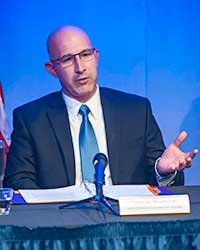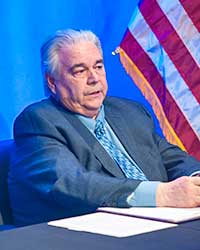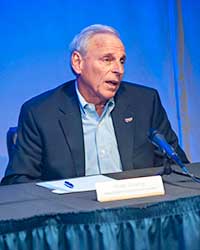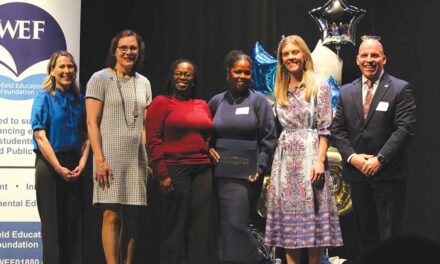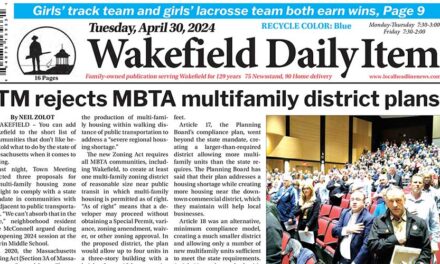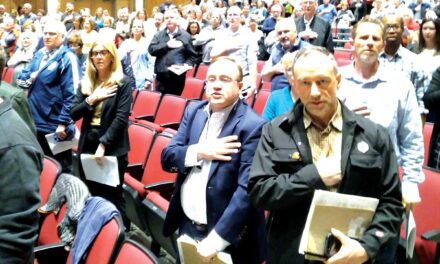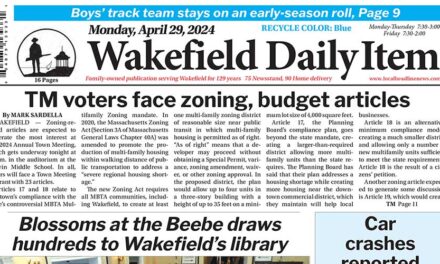Published April 3, 2019
By MARK SARDELLA
WAKEFIELD — The three candidates running for two positions on the Wakefield Municipal Gas & Light Department Board of Commissioners in the April 23 Town Election squared off in a one-hour debate Monday night that was aired live on local cable by WCAT.
Incumbent Gas & Light Commissioner Wayne Tarr of Jackson Lane and challengers Thomas Boettcher of Wakefield Avenue and Philip Courcy of Pine Hill Circle fielded questions from Bob Burgess, editor of the Daily Item, and Colleen Getty, who posed questions submitted by local voters. Getty runs the local “Room to Write” program.
Bill Carroll served as debate moderator.
The candidates were asked to talk about their qualifications for the position of WMGLD Commissioner.
Boettcher said that he comes from a technology background and likes to solve problems. He said that he saw the role of Commissioner as a bridge between the community, the ratepayer and the utility. He said that he felt that his skill set and ability to connect all three roles would make him a unique candidate.
Courcy noted that he was an engineer for 47 years, working for both GE and National Grid as a manager of large projects. He said that his career experience was directly related to the job of a WMGLD Commissioner.
Tarr said that it was important to understand that a Commissioner does not get involved with the day-to-day operations of the Gas & Light Department. He said that his 50 years in the private sector managing large companies aligned well with the role of a WMGLD Commissioner.
The candidates were asked if WMGLD gas and electric customers should be subsidizing solar customers.
Tarr said that under current policy, solar users are allowed to sell back to the MGLD any solar energy they generate in excess of what they use. But Tarr maintained that there should be a limit on the amount of wattage a customer can sell back and the price should not exceed what the department pays for electricity off the grid. He also cautioned that not everyone in town is in a position to take advantage of solar.
Boettcher noted that he owns solar panels and doesn’t see it as being subsidized by the ratepayers. He said that whatever he and other solar users sell back to the WMGLD offsets energy costs for everyone and therefore benefits all users on the grid.
Courcy said that the WMGLD was doing a good job of supporting solar without it being subsidized by the ratepayers. He cited the department’s work with Sustainable Wakefield and offering solar seminars and other assistance as examples of that support.
Faced with a choice between pursuing sustainable energy sources and keeping rates low, the candidates were asked which they would choose.
Boettcher said that he didn’t see it as an either/or choice. He maintained that sustainable sources can help stabilize or even lower rates. “You can have both,” he said.
Courcy noted that the cost of wind and solar energy is coming down. “We should be able to keep rates low as we go into the future and become cleaner,” he said.
Tarr agreed that it was possible to pursue renewable energy sources and keep rates low. He said that as other energy sources like nuclear go away, the Commissioners’ job will be to pursue alternate sources in order to keep rates low.
All three candidates agreed that they would never want to sell the WMGLD to one of the big energy suppliers like National Grid or Eversource. They cited the benefits of a municipally owned utility, including lower rates, reliability and safety.
The candidates were asked to talk about their top priority if elected.
Tarr cited continuing the search for renewable energy sources while keeping rates reasonable.
Boettcher said that he would like to see more transparency in terms of where the MGLD’s energy comes from. He added that he would also like to pursue “community solar,” allowing everyone to have a stake in renewables, including those who rent.
Courcy said that safety should always be the top priority. Keeping rates low should be next, followed by pursuing sustainable energy sources.
Asked about the MGLD’s future when it comes to natural gas, Boettcher noted that New England is currently constrained by pipeline capacity. He said that as home heating moves away from natural gas to electric and heat pump technology, he saw natural gas being used primarily to generate electricity.
Courcy noted that natural gas, while stable for now, is a fossil fuel targeted for elimination. But he noted that the number one target for elimination is home heating oil, with those users being switched first to natural gas and then to electric/heat pump technology.
Tarr noted that 7,100 Wakefield homes now heat with gas. He observed that Wakefield will inevitably move away from natural gas, but he cautioned that it must be done strategically so that Wakefield does not end up with the 22 to 25 percent rate increase that the town of Concord, Mass. is facing.
Tarr said that Wakefield was fortunate to own its Gas & Light Department, noting that rates are about 30 percent lower than those paid by customers of the big companies. Commissioners should oversee the department’s performance in terms of safety, reliability and cost, he said, while making progress with renewables. He applauded those who install solar, as long as it doesn’t result in higher rates for others.
Boettcher said that if elected, he would apply his passion for technology and innovation to enact programs and policies to keep rates low, while also pursuing renewables.
Courcy said that if elected he would be the only engineer on the board. He cited his extensive background, collaborative style and open mind as assets that would make him a good MGLD Commissioner.
—–
The debate was produced by David Watts Jr. The production crew included Ryan Boyd, Adam Nestle, Ian McDermott, Elizabeth Reidy, Mark-Joseph Yirrell, Sean DiGiambatista and Emily Lane.

